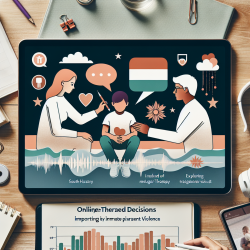The COVID-19 pandemic has drastically altered the landscape of psychotherapy, necessitating a rapid shift from traditional face-to-face interactions to online settings. A recent mini-review titled "Tele-psychotherapy during the COVID-19 pandemic: a mini-review" by Tajan, Devès, and Potier provides valuable insights into the challenges and opportunities presented by this shift. This blog aims to help practitioners improve their skills by implementing the outcomes of this research or encouraging further exploration in this domain.
Key Findings and Recommendations
The mini-review analyzed 46 studies, revealing several critical points that can help practitioners refine their teletherapy practices:
1. Technological Infrastructure and Privacy
- Insufficient technological infrastructure and lack of privacy were significant barriers. Practitioners should ensure stable internet connections and user-friendly devices.
- Privacy concerns, particularly in clients' environments, need addressing. Encouraging clients to find private spaces can mitigate this issue.
2. Training and Support
- Many therapists reported a lack of confidence in teletherapy skills. Regular training sessions can help improve confidence and competence.
- Support systems for therapists, including peer support and supervision, are crucial to reduce stress and prevent burnout.
3. Acceptability and Adaptability
- Teletherapy was generally well-accepted by both therapists and clients, though it presented unique challenges, such as maintaining therapeutic relationships and managing technical difficulties.
- Practitioners should remain adaptable, using a mix of teletherapy and in-person sessions as needed.
4. Specific Populations and Techniques
- Teletherapy can be particularly beneficial for certain populations, such as veterans and children with anxiety disorders. Tailoring approaches to these groups can enhance outcomes.
- Incorporating specific techniques like "tele-chairwork" and ensuring frequent breaks for children can improve session effectiveness.
Encouraging Further Research
The mini-review highlights the need for more extensive research to fully understand the long-term impacts of teletherapy. Practitioners are encouraged to participate in or conduct studies to explore:
- The effectiveness of hybrid therapy models combining online and in-person sessions.
- Specific challenges and solutions for different mental health conditions and populations.
- Innovative techniques and tools to enhance teletherapy practices.
By staying informed and adaptable, practitioners can continue to provide high-quality care in a rapidly evolving therapeutic landscape.
To read the original research paper, please follow this link: Tele-psychotherapy during the COVID-19 pandemic: a mini-review.










